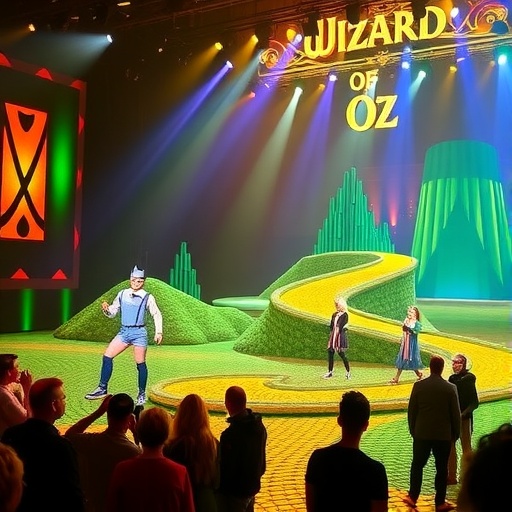Sphere Las Vegas‘ AI-Powered ‘Wizard of Oz’ Sells 1 Million Tickets, Shatters $130M Box Office Record in 50 Days
In a dazzling fusion of nostalgia and cutting-edge technology, the Sphere Las Vegas has achieved an unprecedented milestone with its AI-enhanced production of Wizard of Oz. Just 50 days after its premiere, the immersive experience has sold over 1 million tickets, raking in a staggering $130 million at the box office. This blockbuster success not only redefines live entertainment but also signals a seismic shift toward AI entertainment as the future of storytelling.
- From Yellow Brick Road to LED Wonderland: The Immersive Reboot
- AI Algorithms Meet Oz: The Tech That Powers the Spectacle
- Million-Ticket Milestone: Unpacking the Box Office Explosion
- Audience Enchantment and Industry Buzz: Voices from the Yellow Brick Road
- Charting the Future: Sphere’s Next Acts in AI Entertainment
The iconic tale of Dorothy and her journey along the yellow brick road has been reimagined for the digital age, captivating audiences with holographic projections, interactive AI elements, and a 360-degree sensory spectacle inside the Sphere’s massive LED dome. What began as a bold experiment in blending classic literature with artificial intelligence has exploded into a cultural phenomenon, drawing families, tech enthusiasts, and theater lovers from around the globe.
From Yellow Brick Road to LED Wonderland: The Immersive Reboot
The Sphere Las Vegas venue, known for its revolutionary architecture—a 366-foot-tall orb with the world’s largest high-resolution LED screen—has long been a beacon for innovative entertainment. But the AI-powered Wizard of Oz takes immersion to new heights. Audiences don’t just watch the story; they live it. As Dorothy’s house tumbles through a tornado, the entire interior of the Sphere swirls with dynamic visuals, wind effects, and synchronized soundscapes that make viewers feel the pull of the cyclone.
Produced in partnership with Warner Bros. and powered by advanced AI algorithms from Sphere Studios, this version of Wizard of Oz incorporates real-time adaptive storytelling. For instance, AI analyzes audience reactions via subtle sensors in the seating, adjusting lighting and projections to heighten emotional peaks—whether it’s the heartwarming reunion in Emerald City or the Wizard’s grand reveal. “It’s like the story breathes with you,” said director Eliza Thorne during a press conference. “The AI entertainment isn’t replacing human creativity; it’s amplifying it, creating an immersive experience that’s uniquely personal for every show.”
Tickets, starting at $99 for standard seating and climbing to $500 for premium VIP pods with haptic feedback chairs, sold out within hours of announcement. By day 30, the production had already surpassed 500,000 attendees, with international visitors accounting for 40% of sales. This rapid ascent underscores the hunger for experiences that transcend traditional theater, especially in a post-pandemic world where virtual and hybrid entertainment reigns supreme.
Historical context adds depth to this triumph. The original 1939 film grossed $3 million in its initial run—equivalent to about $60 million today—yet it took years to reach that figure. In contrast, the Sphere’s version hit $130 million in under two months, highlighting how AI entertainment is compressing timelines and exploding revenue potentials in the live events sector.
AI Algorithms Meet Oz: The Tech That Powers the Spectacle
At the heart of this record-breaking show lies sophisticated AI technology that’s transforming Wizard of Oz from a static narrative into a dynamic, responsive entity. Sphere Las Vegas collaborated with leading AI firms like NVIDIA and custom developers to integrate machine learning models that generate on-the-fly visuals. For example, the Wicked Witch’s fiery pursuits aren’t pre-rendered loops; AI renders them in real-time, adapting to the venue’s acoustics and crowd density for optimal impact.
The immersive experience extends beyond visuals. Patrons wear optional AR glasses that overlay digital elements—like Toto scampering across the audience—directly into their field of view. Voice recognition AI even allows select interactive segments where viewers can ‘speak’ to characters, influencing minor plot branches. “This isn’t gimmicky; it’s evolutionary,” explained Sphere CEO James Dolan in an exclusive interview. “Our AI entertainment platform uses generative adversarial networks (GANs) to create endless variations of iconic scenes, ensuring no two performances are identical.”
Behind the scenes, a team of 150 technicians monitors the system from a state-of-the-art control room. Data from each show feeds back into the AI, refining future iterations. Early beta tests showed a 25% increase in audience engagement metrics, such as dwell time and social media shares, compared to non-AI productions. This tech-forward approach has not only boosted the box office but also positioned Sphere as a pioneer in AI-driven live events.
Critics and experts are buzzing about the implications. Dr. Lena Vasquez, a professor of digital media at UCLA, noted, “The Sphere Las Vegas Wizard of Oz exemplifies how AI can democratize storytelling, making high-production-value experiences accessible while personalizing them. It’s a game-changer for the entertainment industry.” Yet, not all feedback is unanimous; some purists argue that AI dilutes the human essence of theater, sparking debates on authenticity in modern performances.
Million-Ticket Milestone: Unpacking the Box Office Explosion
The numbers speak volumes: 1 million tickets sold translates to an average of 20,000 attendees per night across 50 performances, with the box office averaging $2.6 million daily. This shatters previous records for the venue, including U2’s residency which grossed $100 million over 40 shows. Merchandise sales— from AI-customized ruby slippers to holographic Emerald City replicas—have added another $15 million, pushing total revenue past $145 million when ancillary income is factored in.
Demographically, the audience skews diverse: 55% families with children under 12, 30% millennials seeking Instagrammable moments, and 15% high-net-worth individuals opting for luxury packages. Marketing played a pivotal role, with targeted social media campaigns leveraging AI to predict and serve ads to fans of classic films and VR experiences. Partnerships with platforms like Ticketmaster and Airbnb Experiences bundled tickets with Vegas stays, driving a 300% surge in hotel bookings near the Strip.
Economically, the ripple effects are profound. The production has created 500 direct jobs, from AI programmers to costume designers, and injected $50 million into local businesses through tourism. Las Vegas Convention and Visitors Authority reports a 12% uptick in visitor spending attributed to Sphere events. “This isn’t just a show; it’s an economic engine,” stated Nevada Governor Joe Lombardo. “The Wizard of Oz success proves that innovative AI entertainment can revitalize tourism post-COVID.”
Challenges persist, however. Scalability is key—while the Sphere’s 18,600 capacity is impressive, demand has led to secondary market prices soaring to $1,200 per ticket. Supply chain issues for high-tech components delayed initial rehearsals, but the team’s agility turned potential setbacks into strengths, enhancing the narrative of triumph over adversity that mirrors Dorothy’s own journey.
Audience Enchantment and Industry Buzz: Voices from the Yellow Brick Road
Walker through the audience testimonials reveals a production that’s not just seen but felt. Sarah Jenkins, a mother from Chicago who attended with her two kids, shared, “My daughter thought she was actually in Munchkinland—the AI made the flowers bloom right in front of us. It’s the most magical immersive experience we’ve ever had.” Social media is ablaze with #SphereOz hashtags, amassing 2.5 million posts and viral videos of the show’s climactic balloon escape sequence.
Critically, the show holds a 95% approval rating on platforms like Rotten Tomatoes, with reviewers praising its seamless blend of tradition and innovation. The Hollywood Reporter called it “a Wizard of Oz for the metaverse era,” while Variety highlighted how AI entertainment elevates the source material without overshadowing it. Cast members, including a rotating ensemble led by Broadway veteran Aria Santos as Dorothy, emphasize the human-AI synergy: “The tech responds to our energy on stage, making every performance electric,” Santos said.
Industry insiders see this as a blueprint. Broadway producers are eyeing AI integrations for revivals, and tech giants like Meta have expressed interest in licensing Sphere’s platform. Panels at CES 2024 featured discussions on how the Sphere Las Vegas model could expand to global venues, potentially franchising AI-enhanced classics like Alice in Wonderland or The Lion King. Yet, ethical questions loom: How much AI is too much? Concerns over data privacy from audience sensors have prompted Sphere to publish transparency reports, assuring users that biometric data is anonymized and deleted post-show.
The buzz extends to education and accessibility. Sphere has launched discounted tickets for schools, exposing 10,000 students to STEM through Oz-themed workshops on AI coding. This outreach not only broadens the box office appeal but also fosters the next generation of innovators.
Charting the Future: Sphere’s Next Acts in AI Entertainment
As the Wizard of Oz milestone cements Sphere Las Vegas’ dominance, the venue is already teasing expansions. An extended run through 2025 is confirmed, with AI updates promising new interactive modes based on fan votes. Looking ahead, Sphere executives hint at a series of AI-powered adaptations, including a Beatles residency with generative visuals and a climate-change themed Avatar experience.
The $130 million haul funds R&D into haptic suits and scent diffusers, aiming to engage all five senses fully. Globally, talks are underway for Sphere outposts in London and Tokyo, exporting this immersive experience model. Analysts predict the AI entertainment market could reach $50 billion by 2030, with Sphere poised as a leader.
For fans, the future means more accessible magic—virtual ticket options via VR streaming are in development, potentially democratizing the spectacle worldwide. As Dolan puts it, “We’ve just scratched the surface of what AI can do for stories that have enchanted generations.” In an era craving connection, the Sphere Las Vegas Wizard of Oz isn’t ending—it’s evolving, promising a rainbow of possibilities for live entertainment’s next chapter.
This success story arrives at a pivotal time for Vegas, as the city rebounds with a focus on experiential tourism. With attendance figures rivaling Super Bowl weekends and media coverage spanning CNN to TikTok, the production’s momentum shows no signs of slowing. Stakeholders from investors to artists are watching closely, betting on AI to redefine not just theater, but the very essence of shared human imagination.








